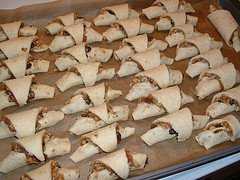Heritage Lost?
 Sometime in the mid 90s, I lived a vastly different form of existence from now, in the yuppy territory on the Upper West side of Manhattan. My apartment was on 67th and Columbus, atop the Reebok gym in which I was a member. Starbucks' was opposite my building and Barnes & Noble was a block away. I was surrounded by convenience and comfort.
Sometime in the mid 90s, I lived a vastly different form of existence from now, in the yuppy territory on the Upper West side of Manhattan. My apartment was on 67th and Columbus, atop the Reebok gym in which I was a member. Starbucks' was opposite my building and Barnes & Noble was a block away. I was surrounded by convenience and comfort.Armed with various guides to follow the bright lights of the Big Apple, like any newcomer, I attended exhibitions, theatres, ate according to the Zagat's, and shopped until my given shipment quota was filled and was time for me to go home.
After that rather cushy stint, I visited the city a few more times, once even during Restaurant Week (a bi-annual event when participating restaurants showcase their skills in a set menu). Apart from seeing friends and colleagues, I did more or less the same each time: theatres, galleries, restaurants and shops. However, there was always a down-to-earth but no less drool-worthy constant - Jewish pastries; fresh bagels from H & H's served with lox and cream cheese, cranberry & walnut filled rugelach were both top of my agenda.
Rugelach is a pastry dough of Ashkenazic orgin, made with cream cheese, rolled up with different fillings. I fell in love with this humble looking snack instantly in a cute little pastry shop along Columbus. During each subsequent stay, I went back to buy them by weight.
When I heard that there is a significant Jewish presence in Buenos Aires, I was filled with culinary anticipation; oh joy! I imagined I could stroll into a local bakery to get bagels for Sunday breakfasts and rugelach to go with mid-morning coffees.
For months, I trawled through Once and Abasto, close to the point of stalking the Rabbis but to no avail. I found a Kosher McDonald's but no Jewish bakeshop, and definitely no trace of their scrumptious goodies. The closest encounter was a sweetish and bready ring being passed off as bagel at the MALBA cafe, and I am still on the look out for those moreish little rugelach.
Can it be true? Has the rich and varied Jewish food culture suffered the same fate as authentic Italian cuisine here? Does assimilation in this city call for complete banishment of one's culinary heritage in favour of empanadas and the porteño take on pizza and pasta?
One of my all time favourite cookbook is "The Book of Jewish Food: An Odyssey from Samarkand and Vilna to the Present Day" by the revered food writer, Claudia Roden, a European Jew herself. It is not so much a cookbook as a tomb of social history, a well-researched testimonial of food being a vital part of culture and civilisation.
Well, the recurring theme of my blog seems to be "when one can't get, one turns self-reliant!" I can beat the streets some more or I can follow the simple recipe for rugelach in the comfort of my own home, the choice is obvious.
This is my take on those red fruit & nut versions I prefer. Sour cream is not available in supermarkets here and this is one thing I haven't the capacity to make; but if you use the local queso blanco (white cheese) which is wetter than the Philly, you can omit sour cream altogether. If the dough does get too dry, add a dollop of natural yoghurt. Dried cranberries are another item I haven't seen here, substitute with raisins.
The dough:
425g plain flour
1/4 tsp salt
50g caster sugar
3 tsp dry yeast
250g cold butter
100g cream cheese
1 egg
60ml sour cream
The filling:
1 cup dried cranberries or raisins in my case, soaked
3 tbsp raspberry jam, apricot if using raisins
100g chopped walnuts
The egg wash:
1 egg, beaten
The sugar glaze:
3 tbsp caster sugar
3 tbsp boiling water
Preheat oven to 190C. Mix ingredients for the filling, set aside.
Mix dry ingredients for the dough in a bowl. Add butter and cream cheese. Process until the mixture becomes a soft dough. Divide the dough into 3 and work in batches. Put the remaining dough in the fridge.
Roll out dough on a lightly floured surface to a circle of 25 in diameter. Cut the circle into 12 portions. Brush the surface with some melted butter, then spoon a little of the filling mixture onto each triangle. Then carefully pull each triangle away from the centre and roll them up to form a croissant. Repeat this with the rest of the dough.
Put the rugelach on a lined baking tray. Let them stand for 20min in a warm place. Then brush the top of each with egg wash. Bake them in the preheated oven for 20min.
When they come out of the oven, brush the tops with sugar glaze. Let them cool on a rack. Then inhale as many as you like with a cup of black coffee.


<< Home